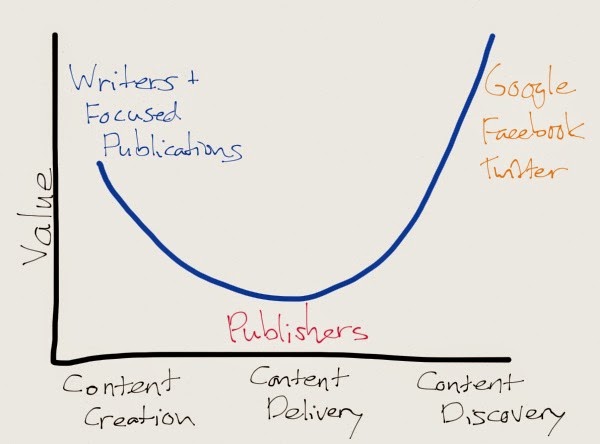Publishing and the Smiling Curve
Ben Thompson wrote a couple of very interesting articles on the future of the publishing industry. The theme of both articles was the following “smiling curve” that he drew:
The Internet has made content delivery free; which is why the publishing industry is getting wiped out. David Carr describes the clout of mobile apps like Facebook in particular on this topic: incident:
“For traditional publishers, the home page may soon become akin to
the print edition — nice to have, but not the primary attraction. In the last
few months, more than half the visitors to The New York Times have come via
mobile — the figure increases with each passing month — and that percentage is
higher for many other publishers.”
You
might wonder why it matters how the publishers are getting traffic as long they
are getting traffic. Thompson explains why the source matters:
“When people follow a link on Facebook (or Google or Twitter or
even in an email), the page view that results is not generated because the
viewer has any particular affinity for the publication that is hosting the
link, and it is uncertain at best whether or not their affinity will increase
once they’ve read the article. If anything, the reader is likely to ascribe any
positive feelings to the author, perhaps taking a peek at their archives or Twitter
feed.”
In
other words, the right side of the smiling curve adds to the value of the left
side of the smiling curve and makes the middle (publishers) with almost no
value! The keyword there is “almost”. Remember the time the German publishers
took Google to court to demand compensation for article snippets shown on
Google News? Google responded by removing all such snippets and the publishers
lost a huge amount of traffic. No wonder they went crawling back to Google
asking to be added back…without compensation! Thompson has an interesting
takeaway from that incident:
“The general takeaway (was) that Google proved it was adding value
to the publishers, but I have a different angle: the publisher’s demonstrated
that they provide no value to their writers.”
Publishing
is appearing more and more like the middleman thanks to the Internet; and the
middleman eventually gets thrown out…unless they bribe campaign with
politicians to let them stay. And the German publishers are screaming to their
government to save them: is that the only way for publishers to save
themselves?

Comments
Post a Comment